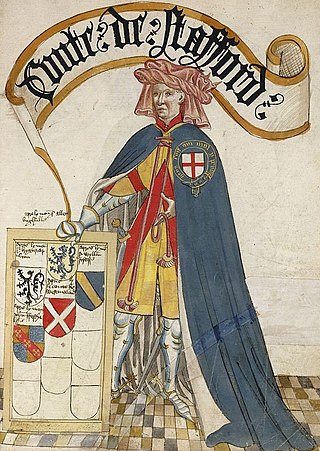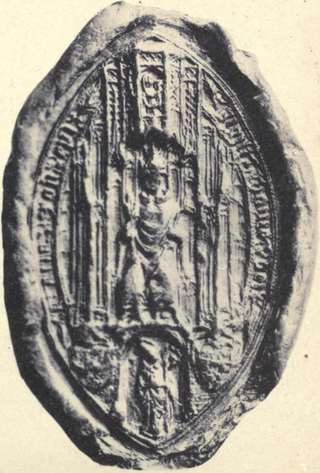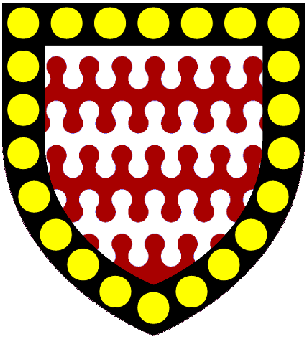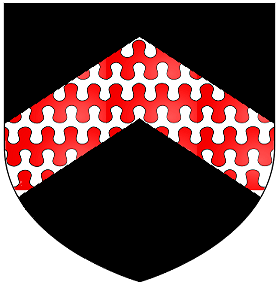Michael Northburgh,otherwise Michael de Northburgh (Northborough),was the Bishop of London between 1354 and his death in 1361. He was the nephew of Roger Northburgh,Bishop of Coventry and Lichfield.

Sir William Gascoigne was Chief Justice of England during the reign of King Henry IV.

Ralph de Stafford,1st Earl of Stafford,2nd Baron Stafford,KG,of Stafford Castle and Madeley Castle in Staffordshire,was an English nobleman and a notable soldier during the Hundred Years' War against France.

Thomas de Brantingham was an English clergyman who served as Lord Treasurer to Edward III and on two occasions to Richard II,and as bishop of Exeter from 1370 until his death. De Brantingham was a member of the Brantingham family of North East England.
Sir William Scott was an English lawyer,and Chief Justice of the King's Bench from 8 January 1341 to 26 November 1346. Originally from Yorkshire –probably Birthwaite in Kexbrough –Scott as Chief Justice presided over trials resulting from Edward III's purge of the administration the previous years. Among those tried was William de la Pole. After retiring from this position,Scott largely withdrew from public life,probably because of ill health. He returned to Yorkshire to attend to his estates. The Oxford Dictionary of National Biography says that he "was still alive on 10 March 1352...but was certainly dead by 11 May 1356,and probably by 1354".

Sir William de Shareshull KB (1289/1290–1370) was an English lawyer and Chief Justice of the King's Bench from 26 October 1350 to 5 July 1361. He achieved prominence under the administration of Edward III of England.
Sir Henry Green,of Boughton,(died 6 August 1369) was an English lawyer,and Chief Justice of the King's Bench from 24 May 1361 to 29 October 1365. He was speaker of the House of Lords in two Parliaments (1363–64).

Sir John Knyvet was an English lawyer and administrator. He was Chief Justice of the King's Bench from 1365 to 1372,and Lord Chancellor of England from 1372 to 1377.

Sir Richard Rainsford SL (1605–1680) was an English judge and politician who sat in the House of Commons between 1660 and 1663. He became Chief Justice of the King's Bench.
Sir William Hussey of Sleaford,Lincolnshire,SL was an English lawyer who served as Attorney General and as Chief Justice of the King's Bench.
Bertha Haven Putnam was an American historian,specialising on the judicial and administrative history of medieval England.
Sir William Bereford was an English justice.
Sir William Herle (1270–1347) was a British justice. He was first appointed as an attorney for the Common Bench in 1291,and was appointed as a Serjeant-at-law for the Bench in 1299 and was in regular attendance until 1320. In 1315 he was made a King's Serjeant,and in 1320 replaced John Benstead as a junior justice for the Common Bench,being knighted in the same year. He was absent from the court for three terms in 1321 while sitting as a justice on an Eyre in London with Hervey de Stanton,but otherwise served continuously as a junior justice until he replaced Stanton as Chief Justice in 1327. He left in 1329 to serve on two Eyres in Nottinghamshire and Derbyshire,and returned in 1331. He left again in 1333,although he returned the same year,serving until 1335,making him one of only two Chief Justices of the Common Pleas to be appointed and then leave on three separate occasions;the other,Sir John Stonor,was his replacement on two of those occasions. He lived for another twelve years after retirement,dying in 1347.
Sir Robert Thorpe KS JP was a British justice. He was the son of another Sir Robert Thorpe,and is occasionally confused with another Robert Thorpe who was second master of Pembroke College,Cambridge at around the same time. The Thorpe family produced many prominent lawyers,including William de Thorpe,Chief Justice of the King's Bench,who may have been influential in guiding Robert towards a judicial career. In 1339 he was made a Serjeant-at-law,and between 1345 and 1356 served as a King's Serjeant. He served as a Justice of the Peace in Cambridgeshire,Huntingdonshire,Norfolk,Suffolk,Bedfordshire and Buckinghamshire,and was also involved in Assize,Gaol delivery and Oyer and terminer. On 27 June 1356 he was appointed as Chief Justice of the Common Pleas and knighted,and on 1 October he was awarded a grant of £40 to support his new position. He was a member of the councils of both the Black Prince and John of Gaunt,and was appointed a Trier of Petitions at every Parliament between 1362 and 1371.

Sir William Hankford KB of Annery in Devon,was an English lawyer,and Chief Justice of the King's Bench from 1413 until 1423.

Sir Miles Stapleton of Bedale KG (1320?–1364) was an English knight,and one of the Knights Founder of the Order of the Garter.
Adam Houghton,also known as Adam de Houghton,was Bishop of St David's from 1361 until his death and Lord Chancellor of England from 1377 to 1378.

Sir William de Notton,or Norton was an English landowner and judge,who had a highly successful career in both England and Ireland,culminating in his appointment as Lord Chief Justice of Ireland in 1361.
Francis Thorpe (1595–1665) was an English barrister,judge and politician.
Sir Robert I Hill,sometimes written Hull,was an English politician and judge from the West Country.








